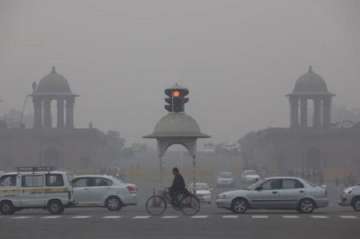Delhi's air pollution went down drastically on Wednesday as gusty winds and rains helped flush out key pollutants leading the AQI to improve from the 'poor' to 'moderate' category. However, these "clean air" days will be short-lived, with pollution set to spike again from Saturday.
According to SAFAR estimates, most of the areas in the national capital on Wednesday morning, including Pusa Road, Lodhi Road, IIT-Delhi, Indira Gandhi International Airport (Terminal-3), and Ayanagar recorded air quality in the 'poor' category with an AQI of 111, 121, 135, 139, 173 and 156 respectively.
The Delhi University area recorded the cleanest air with an AQI of 97.
Under the influence of Western Disturbance (WD) which prevailed on Tuesday, Delhiites experienced some respite on Wednesday. There was comparatively better breathable air than what had been consistently over the past week.
The Air Quality Index (AQI) touched 132, according to the latest estimates updated by the System of Air Quality and Weather Forecasting And Research (SAFAR). PM10 has now become the lead pollutant instead of PM2.5.
The environment watcher bodies though said the significant improvement in Delhi air quality would be short-lived.
The Ministry of Earth Sciences officials predicted the AQI likely to deteriorate soon.
"The AQI is forecast to be in moderate to the Poor category for tomorrow.
"AQI is forecast to further deteriorate to the higher end of the Poor to the lower end of the Very Poor category on November 20, 21, as the conductive meteorological environment created after rainfall is slowly retreating."
As per the ministry, one of the reasons behind the deterioration could be the increased share of stubble burning in the atmosphere.
"Stubble burning share in PM2.5 in Delhi's air is likely to increase marginally and estimated at 8 percent. The AQI is likely to marginally deteriorate and forecasted to be in moderate to the Poor category for tomorrow," it said.
"Surface winds are calm and boundary layer wind direction is North-Westerly (favourable for intrusion). Effective Stubble fire counts with sufficient potential estimated from SAFAR-multi-satellite products are marginally increased and are around 427," it added.
The ministry has also forecast that the air quality of Pune is in the Satisfactory category but likely to marginally deteriorate and stay in the Satisfactory to Moderate for the next three days. Besides, Mumbai and Ahmedabad are in the Moderate category.
Latest India News

